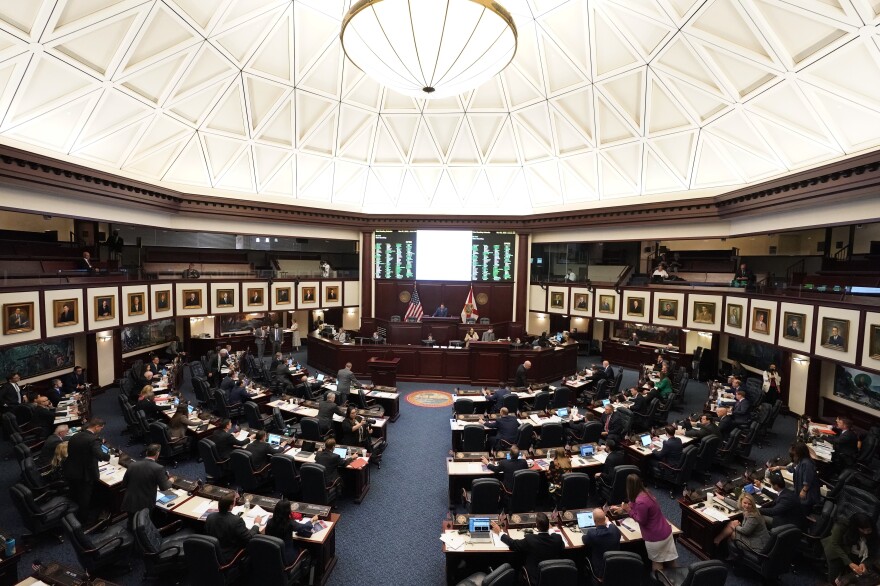The Florida Legislature passed a major housing bill the last week of March.
The new law (SB 102), dubbed the Live Local Act, marks an historic investment in affordable housing through a series of tax breaks, incentives for development and up to $811 million in funding.
Kody Glazer is the legal and policy director for the Florida Housing Coalition. He spoke with WUSF's Gabriella Paul about what the new law means for renters and homeowners in the state:
So looking at this sweeping housing bill that has just passed in the Legislature — what was the legislative intent? What was the backbone of the strategy of this bill?
The overwhelming purpose of the Live Local Act is to build more homes, period. You know, that's what we need in Florida. There is really no argument anymore that we have an affordable housing problem. And so the the purpose of the act — and that's reflected in the several great policy tools in there — is to get more homes built.
Could we talk for a bit just about how noteworthy it is compared to past legislation?
Sure. So, I mean, the Live Local Act is the most impactful piece of housing legislation we've had in Florida in over 30 years. The Sadowski Act, which was passed in 1992, was the watershed bill in Florida that created a dedicated revenue source for affordable housing in our state. The Live Local Act builds on the Sadowski Act and more, and it's really a new era for how the Legislature approaches affordable housing policy in our state.
So definitely historic legislation here. For those who may not be aware, could you explain why the Sadowski funds being restored is a significant part of this bill?
What we commonly refer to as the Sadowski [Housing] Trust Funds...each and every year, the Legislature still has to take within the trust funds, and put them towards specific programs.
However, starting in 2001, the Legislature developed a nasty habit of taking monies collected for affordable housing through the Sadowski Act and diverting it to other things. And so there was a 20-year period there where the Legislature diverted over $2 billion.
In 2021, we had a bill that first reduced the amount that goes into the trust funds by 50%, but with statutory language that says that the funds collected now for housing cannot be used for anything but affordable housing... And so this will be the third session in a row where the Legislature will be fully funding our affordable housing programs.
We've talked about how this is a historic bill for Floridians in terms of affordable housing. In your opinion, how was the reception among supporters first, and then among its opponents?
So I think on the pro side, it's been overwhelmingly positive, I would say. I think a lot of the folks who are in the business of building homes, who advocate for affordable housing, view this bill as a very, very great piece of legislation. On the opponent side, I'm sure you saw a lot of opponents critique the rent control prohibition, which we can get into. I think that particular provision was the most divisive part of the Live Local Act.
In section two, so high up in the bill, is that preemption to rent control, which in the past year, we have seen a handful of local governments — including the city of Tampa and city of St. Petersburg — consider.
And it's important to note that housing advocates across the state — their real argument was that this was a tool for immediate help that has left their toolbox — (whereas) this (bill's) approach is really through supply and demand and creating more supply of housing within the market. One strategy to really address this has been the relaxed zoning regulations that are in this legislation. Could you break those down for us?
So this, to me, (is) one of the more exciting parts of the Live Local Act. What this bill would do, starting July 1, is it would say that if you have an affordable housing development, and you propose that development on any site, in your city or county that zoned for commercial, industrial or mixed use, then basically local government is limited, in some respects, from saying no to those projects.
Right now, if you wanted to build an affordable housing development in an area zoned commercial, for example, sometimes the city or county in their zoning codes might say, well, housing isn't an allowed use here. (So) if you want to actually build affordable housing in this part of town, you have to go through a rezoning, you have to go through a comprehensive plan amendment process, you know, things that could take months to even years to get done.
So as we've talked about, there's one main goal for this legislation, which is to address the affordable housing need in Florida. But it's doing that through a myriad of ways, including tax breaks, incentives to develop down payment assistance, and the list goes on.
As a legal and policy director for the Florida Housing Coalition, I'm curious what you personally make of it?
I mean, I'm personally very excited to see what happens not only in implementing this particular bill, which again, there's already a huge buzz around it, but also what can happen in sessions to come as the Legislature discusses and enacts more policies that can even get us closer to a Florida where everyone who wants to live here can afford to live here.
Gabriella Paul covers the stories of people living paycheck to paycheck in the greater Tampa Bay region for WUSF. She's also a Report for America corps member. Here’s how you can share your story with her.





